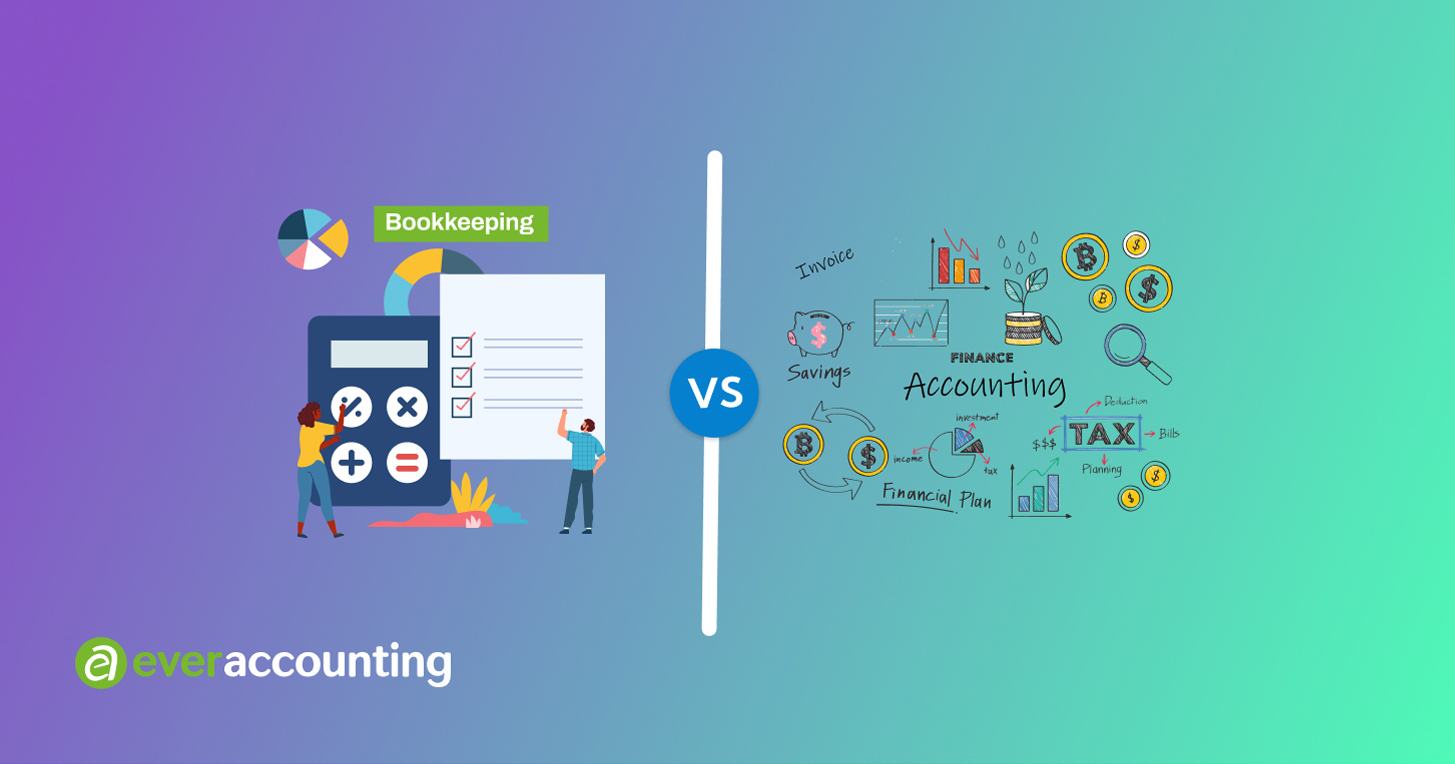Are you a small business owner who is confused about bookkeeping and accounting? Don’t worry, you’re not alone! Many people use these terms interchangeably, but they actually refer to two distinct processes.
Bookkeeping and accounting can help if you have bills and receipts building up on your desk and invoices spilling out of your drawers. Without these methods, you may have problems keeping your business organized and may have trouble gauging its financial health.
Bookkeeping involves recording financial transactions on a daily basis, while accounting focuses on interpreting and analyzing financial data to make strategic business decisions.
In this article, we’ll break down the differences between bookkeeping and accounting to help you understand their individual roles and importance in running a successful business.
What is Bookkeeping

Keeping accurate books involves keeping track of money coming in and going out on a regular basis. It serves as the foundation for accounting and helps businesses keep track of their financial health.
Bookkeeping involves categorizing transactions correctly, adding them to the appropriate accounts, and ensuring that the books are balanced. There are two primary methods of bookkeeping: single-entry and double-entry.
Single-entry bookkeeping is a more simple method where each financial transaction is recorded in a single column, while double-entry bookkeeping involves recording each transaction in at least two accounts, with one account being credited and the other debit.
Bookkeeping can be done manually, using a pencil and paper or an Excel spreadsheet, or by using accounting software.
The purpose of bookkeeping is to provide accurate financial records, which can be used for analyzing business performance, making tax filings, and presenting financial reports to stakeholders. Whether done in-house or outsourced, bookkeeping is an essential task for any business looking to grow and succeed.
Specific Tasks of Bookkeeping Usually include:
- Keeping track of money by keeping a ledger and allocating transactions to the right accounts.
- The process of comparing the amounts listed on bank statements with those listed in the ledger, usually once a month.
- Keeping track of money owed and received to ensure that bills get paid and customers pay their share. Both client bills and notices of overdue payments fall under this category.
- Payroll processing includes tasks such as verifying employee hours worked and determining appropriate deductions.
- Collaborating on the creation of financial reports.
What is Accounting

Accounting goes beyond basic record-keeping and involves a more in-depth analysis of a company’s financial data. It is a process that makes sense of the financial transactions that have been recorded in bookkeeping and turns them into usable information that can help businesses make informed decisions.
The primary goal of accounting is to produce accurate financial reports that summarize the financial health of a business. These reports can include balance sheets, income statements, cash flow statements, and other financial analyses that are useful for measuring performance, identifying trends, and making strategic decisions.
There are two primary types of accounting: management accounting and financial accounting.
Management accounting involves creating internal reports that are used to make decisions within the company, while financial accounting focuses on producing external reports that are shared with shareholders, lenders, and regulatory agencies.
In addition to producing reports and analyzing financial data, accounting also involves managing financial risk and complying with relevant financial regulations. This can include maintaining regulatory compliance, setting budgets, forecasting financials, and managing taxes.
Accounting is an essential component of any successful business, as it provides managers with the information they need to make informed decisions, investors with the information they need to evaluate a company’s financial health, and regulators with the information they need to enforce financial compliance.
Specific Tasks of Accounting Usually Include:
- An accountant calculates the company’s tax due by reviewing the financial statements and general ledger and then files the return.
- Providing guidance to the business owner on matters of taxation, regulation, and financial stability. An accountant’s services to an online retailer may include advice on how to properly collect sales taxes from different states and how to account for the financial impact of client returns.
- Facilitating the pursuit of external funding via loans or other means. The accountant might attest to the company’s sound financial standing, which could result in better loan terms.
- Assist in making financial plans and projections by consulting economic data and mathematical models. The accountant may advise waiting to implement expansion plans if, for instance, a general economic slowdown is predicted, interest rates rise, or tax regulations are altered.
Similarities Between Bookkeeping and Accounting

Both bookkeeping and accounting are critical components of a business’s financial management and work hand in hand to ensure that a business remains financially viable. Here are some similarities between bookkeeping and accounting:
1. Same financial data
Both bookkeeping and accounting use the same financial data, and bookkeeping becomes the foundation for accounting. The accounting process cannot begin without accurate bookkeeping records.
2. Historical Transactional data
Both bookkeeping and accounting rely on historical transactional data recorded over time.
3. Accurate Reporting
Both help generate accurate financial reports that enable businesses to make informed decisions and be compliant with financial regulations.
4. Monitor Financial Transactions
Bookkeeping and accounting both monitor financial transactions to ensure the accuracy of financial statements.
5. Important to Small Businesses
Both bookkeeping and accounting are crucial for small businesses as they help them to manage their finances efficiently and improve their financial performance.
In summary, bookkeeping and accounting are interdependent processes that aim to maintain accurate financial records and reporting. Accurate bookkeeping is vital for accounting, while accounting provides a more comprehensive financial analysis to help businesses make informed financial decisions.
Differences Between Bookkeeping and Accounting

While bookkeeping and accounting are related, they differ in their scope and purpose. Here are some differences between bookkeeping and accounting:
1. Process
Bookkeeping is the process of recording daily financial transactions of a business, while accounting is the process of using that financial data to analyze a business’s performance, make informed decisions, and create financial reports.
2. Objective
Bookkeeping is primarily concerned with recording and maintaining accurate financial records, while accounting is more focused on interpreting and analyzing financial data to guide business decisions.
3. Skills
Bookkeeping typically requires basic math skills and proficiency in bookkeeping tools like Quickbooks, excel spreadsheets, and other software, while accounting requires a higher level of financial knowledge and analysis skills.
4. Analysis
Accounting involves interpreting financial data to explain what has happened or is happening in a business, analyzing the results, and using that information to make decisions. Bookkeeping focuses more on accurately recording the data to support financial analysis.
5. Reporting
Bookkeeping produces financial statements, such as balance sheets, cash flow statements, and income statements that form the basis for accounting reports. Accounting, on the other hand, produces various reports to provide a broader view of the business’s financial performance.
Overall, bookkeeping is a transactional and more straightforward process focused on recording financial data accurately, while accounting is an analytical process focused on making informed decisions based on that data.
When Should You Hire a Bookkeeper or an Accountant

Deciding when to hire a bookkeeper or an accountant largely depends on the size and complexity of your business. If you’re a small business owner with simple transactions, bookkeeping software can help you manage your finances more efficiently without the need for outside help.
However, if you start seeing discrepancies in your records or want to improve financial management, hiring a bookkeeper can be a great option.
A bookkeeper can handle day-to-day bookkeeping functions such as invoicing, payments, and data entry, freeing up your time to focus on running your business. A bookkeeper can also help you track your expenses and monitor cash flow, ensuring that you’re on top of your finances and making informed decisions.
As your business grows and your financial transactions become more complex, hiring an accountant can be the next step. Accountants can provide financial advice, create financial reports, analyze financial data, prepare tax returns, and help you plan for the future.
They can also help identify potential areas of risk, provide recommendations, and help ensure that you’re compliant with financial regulations.
If you’re not sure whether you need a bookkeeper or an accountant, it’s always a good idea to seek professional advice. A financial advisor can help you understand your business’s needs and make an informed decision about who to hire.
Regardless of whether you hire a bookkeeper or an accountant, investing in professional help can ultimately save you time, and money, and maximize your business’s financial potential.
Bookkeeping vs Accounting
Bookkeeping and accounting are two critical components of financial management for any business. While they may seem similar, they serve different functions and require distinct skills.
Bookkeeping involves recording financial transactions and maintaining accurate financial records, while accounting involves interpreting financial data to create reports, analyzing financial performance, and making informed decisions.
Both bookkeeping and accounting are vital for the growth and success of any business. Poor bookkeeping can lead to inaccurate financial data, while ineffective accounting can result in poor financial decisions that can seriously impact a business’s bottom line.
Skilled bookkeepers and accountants can provide invaluable support, freeing up business owners’ time so that they can focus on running their businesses effectively.
Ultimately, businesses that invest in professional bookkeeping and accounting services can gain a competitive advantage by gaining a more in-depth understanding of their financial performance and making informed, data-driven decisions.
Wrap Up

Bookkeeping and accounting are two critical components of financial management for any business. While they may seem similar, they serve different functions and require distinct skills.
Bookkeeping involves recording financial transactions and maintaining accurate financial records, while accounting involves interpreting financial data to create reports, analyzing financial performance, and making informed decisions.
Both bookkeeping and accounting are vital for the growth and success of any business. Poor bookkeeping can lead to inaccurate financial data, while ineffective accounting can result in poor financial decisions that can seriously impact a business’s bottom line.
Skilled bookkeepers and accountants can provide invaluable support, freeing up business owners’ time so that they can focus on running their businesses effectively.
Ultimately, businesses that invest in professional bookkeeping and accounting services can gain a competitive advantage by gaining a more in-depth understanding of their financial performance and making informed, data-driven decisions.
That’s all for now. Until next time!
Adios!
